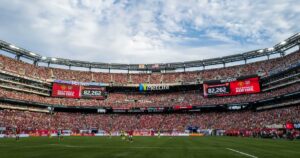Forbes.com recently released a report that looked at the economic side of MLS and also put a value on each of the Major League Soccer franchises.
At a macro level, things are looking up for MLS. Seven of the league’s 14 teams play in soccer-specific stadiums, five of which have been built since 2002. Expansion franchises in Seattle and Philadelphia recently agreed to pay $30 million each to join the league, three times what Toronto FC paid to join MLS three years ago. Commissioner Don Garber says the next two expansion teams, to be announced in 2009, will cost $40 million. Some team owners are even floating a $50 million price tag.
As expected, Forbes estimates that MLS is not yet profitable, with its 13 teams posting an operating loss (in the sense of earnings before interest, taxes and depreciation) of $20 million on revenue of $165 million. In 2007, the three teams that were in the black–Los Angeles Galaxy, Toronto FC and FC Dallas–had a combined operating profit of $6.7 million.
Interestingly, Soccer United Marketing, a separate business owned by investors in the league, runs the league’s national television deals ($23 million last season from ESPN, Fox, HDNet and Univision), as well as the commercial rights to a bevy of soccer properties (such as the U.S. rights to the FIFA World Cup) distributed less than $1 million to each team last season. That means that to be successful in MLS, a team has to generate a lot of cash from its stadium and local television and sponsorship deals. That is easier for some teams to do than others.
One team that is making money is the Los Angeles Galaxy, who are worth $100 million according to Forbes. David Beckham is responsible for a lot of the corporate money flowing to the Galaxy. Two months after his arrival last year, weight loss firm Herbalife agreed to a $4 million-a-year jersey sponsorship deal, twice what any other team commands.
The Galaxy also generates substantial revenue at the gate. The team’s stadium, Home Depot Center, has 48 suites that lease for as much as $150,000 a season. The 1,500 club seats cost an average of $4,500 per season. Sponsors like American Express, Delta Air Lines and Valero Energy bring in another $6 million annually for the team. Think all these corporations would be associating themselves with the Galaxy if Beckham was not playing? Not al these levels.
Surprisingly number two on the list is Toronto FC. Forbes estimates Toronto is worth $44 million, up four-fold in just three years. The team turned a profit of $2.1 million in its inaugural season last year, when it sold every ticket at 20,500-seat BMO Field.
The value of playing in a soccer specific stadium cannot be overstated. Real Salt Lake is moving into a new soccer only stadium and RSL forecasts that revenues will increase from $7.6 million to $20.3 million in 2009, its first full year in its new stadium. The team will control the stadium and get more money from sponsorships, concessions and non-soccer events. That is a huge revenue increase.
A soccer only stadium is however not helping the Columbus Crew who cannot find sponsors and only generated just $6 million in revenue. Chivas USA only had $10 million in revenue because they are tenants of the Galaxy at Home Depot Center.
Team By Team Valuations
No. 1 Los Angeles Galaxy
Value: $100 million
Revenue: $36 million
Operating Income: $4.0 million
The Galaxy was already the league’s marquee team before the arrival of David Beckham, soccer’s most renowned superstar, last summer. Now they’re in another stratosphere–L.A.’s $36 million of revenue in 2007 was double that of any other team.
No. 2 Toronto FC
Value: $44 million
Revenue: $17 million
Operating Income: $2.1 million
Hailed by the commissioner as a model team, Toronto FC sold out every game in its inaugural season. The average spectator spent $4.03 on souvenirs a game–that’s a higher rate than MLSE’s flagship sports property: hockey’s Maple Leafs.
No. 3 Chicago Fire
Value: $41 million
Revenue: $16 million
Operating Income: -$3.1 million
In exchange for $98 million of public financing to construct Toyota Park, the Fire share revenues from parking, premium seating and general ticket sales with the Village of Bridgeview, Ill. The upside for the team: no debt service on a state of the art soccer stadium, which is a far cry from cavernous Soldier Field, where they once went 53 days between home games, playing second fiddle to the NFL’s Bears.
No. 4 FC Dallas
Value: $39 million
Revenue: $15 million
Operating Income: $0.5 million
The franchise once known as the Dallas Burn, which for a time called a high school football stadium home, has undergone dramatic changes in recent years. Highlights include moving into a soccer-specific stadium in 2005–complete with a 20-year, $25 million naming rights deal–increased TV exposure and, of course, the new name. The next step in their extreme makeover: trying to secure a jersey sponsorship.
No. 5 New York Red Bulls
Value: $36 million
Revenue: $10 million
Operating Income: -$4.5 million
The Red Bulls hope their days as a small fish in the big New York sports pond will be over once they begin play at Red Bulls Arena in Harrison, N.J., next year. The Austrian energy drink giant is betting big on a turnaround: paying $150 million for the team, its naming rights and construction costs since 2006.
No. 6 D.C. United
Value: $35 million
Revenue: $13 million
Operating Income: -$3.0 million
The most storied team in the league’s brief history is languishing in 47-year-old RFK Stadium. “The stadium does not generate enough revenue on game day because it’s so antiquated,” says Kavin Payne, the team’s president. The team is in talks with both the District of Columbia and Prince George’s County, Md., and hopes to announce plans for a new stadium in the fall.
No. 7 Houston Dynamo
Value: $33 million
Revenue: $10 million
Operating Income: -$1.8 million
The Dynamo attracted a strong following after winning the MLS Cup in both seasons since moving to Houston from San Jose, Calif. A partnership that includes famed boxer Oscar De La Hoya bought half the team last year in a record deal that valued the club at $45 million. Now the Dynamo just needs a new stadium to justify the high price.
No 8. Colorado Rapids
Value: $31 million
Revenue: $11 million
Operating Income: -$2.2 million
By establishing a commercial partnership with famed English Premier League team Arsenal, of which Kroenke owns 13%, the Rapids added instant credibility to their brand. Yet challenges remain: The team took a loss airing games on local TV last year when production costs outweighed advertising revenue, despite having favorable terms with Kroenke-owned broadcast partner Altitude Sports & Entertainment.
No. 9 Real Salt Lake
Value: $30 million
Revenue: $7 million
Operating Income: -$2.1 million
The opening of a soccer-specific stadium next month in Salt Lake City suburb Sandy will usher in a new era for the team, which is currently a tenant at the University of Utah’s football stadium. Real Salt Lake became the first MLS team to acquire a jersey sponsorship, reaching a four-year, $4 million deal with XanGo, a dietary supplement company, before the 2007 season.
No. 10 New England Revolution
Value: $27 million
Revenue: $10 million
Operating Income: -$1.5 million
The Krafts are hoping that the success of their other team, the NFL’s New England Patriots, will rub off on the Revolution. Management is exploring options to construct their own stadium–a necessary step to keep pace with the league’s other big market teams, many of which have already moved into cozier, more soccer-friendly confines.
No. 11 Chivas USA
Value: $24 million
Revenue: $10 million
Operating Income: -$1.0 million
Established as the sister organization of a famed Mexican team, Chivas targets the millions of Hispanic soccer fans on the West Coast as its primary audience. Riding the coattails of the more popular L.A. Galaxy has proved both a blessing and a curse; packaging the teams has translated into higher TV rights and more premium seat sales, but Chivas retain a much smaller cut of revenues.
No. 12 Columbus Crew
Value: $23 million
Revenue: $6 million
Operating Income: -$4.5 million
Columbus set the blueprint for MLS teams when they opened the league’s first soccer-specific stadium in 1999. How times have changed. Playing in the league’s second-smallest market with a dearth of sponsors and non-soccer events held at their stadium, nowadays the Crew set the standard in just one category: operating loss.
No. 13 Kansas City Wizards
Value: $22 million
Revenue: $5 million
Operating Income: -$2.9 million
Better days appear ahead for the Wizards, who left a horrendous situation at gaping Arrowhead Stadium during the last off-season. Initial approval of $275 million in public incentives toward the construction of an ambitious retail complex with a soccer stadium as its centerpiece (to be ready in 2010) was granted by the city council last December.


